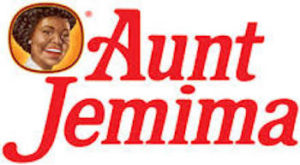
*On this date in 1899, Aunt Jemima pancakes began selling in stores. They are a brand of pancake mix, syrup, and other breakfast foods.
The Aunt Jemima pancake mix debuted as the first ready-mix and became one of the most recognized brands in US history. 1888 St. Joseph Gazette editor Chris L. Rutt and his friend Charles G. Underwood bought a flour mill. Rutt and Underwood's Pearl Milling Company faced a glutted flour market, so they sold their excess flour as a ready-made pancake mix in white paper sacks with a trading name dubbed "the first ready-mix."
In this context, "Aunt" was a Southern address used with older slaves. They were denied the use of courtesy titles. "Aunt Jemima" appeared on the stage in Washington, D.C., as early as 1864. Rutt's inspiration for Aunt Jemima was the American-style minstrelsy/vaudeville song "Old Aunt Jemima," written in 1875. Rutt reportedly saw a minstrel show featuring the "Old Aunt Jemima" song in the fall of 1889, presented by blackface performers; the actor playing Aunt Jemima wore an apron and scarf, and he appropriated this Aunt Jemima character to market the Pearl Milling Company pancake mix.
However, Rutt sold their company to the Randolph Truett Davis Milling Company in 1890. Davis improved the flavor and texture of the product, and it was renamed Aunt Jemima Mills in February 1914. By 1915, the Aunt Jemima brand was so well recognized that it changed the trademark infringement precedent, the "Aunt Jemima Doctrine." The Quaker Oats Company purchased the Aunt Jemima Mills Company in 1926 and formally registered the Aunt Jemima trademark in April 1937. It remains one of the longest continually running logos and trademarks in the history of American advertising.
Quaker Oats introduced Aunt Jemima syrup in 1966. This was followed by Aunt Jemima Butter Lite syrup in 1985 and Butter Rich syrup in 1991. Aunt Jemima Frozen Foods was licensed out to Aurora Foods in 1996, which in 2004 was absorbed into Pinnacle Foods Corporation. Aunt Jemima is based on the common "Mammy" stereotype, a character in minstrel shows in the late 1800s. Her skin is dark and dewy, with a pearly white smile. She wears a scarf over her head and a polka dot dress with a white collar, similar to the common attire and physical features of "mammy" characters throughout history.
Over the years, more than one Black woman has been hired to promote their products, and Nancy Green is one of the more well-known spokespersons. On August 5, 2014, descendants of Anna Short Harrington filed a lawsuit in the US District Court for the Northern District of Illinois against defendants Quaker Oats and PepsiCo for $2 billion. The suit, also named as defendants Pinnacle Foods and its former suitor Hillshire Brands, accused the companies of failing to pay Harrington and her heirs an "equitable, fair share of royalties" from the pancake mix and syrup brand that uses her likeness and recipes. The lawsuit was dismissed with prejudice and without leave to amend on February 18, 2015. The Aunt Jemima character is based on the "Mammy" Black stereotype.
On June 17, 2020, following the global protests of the killing of George Floyd. Quaker Oats announced that the Aunt Jemima brand would be rebranded "to make progress toward racial equality."Quaker Oats’ vice president and chief marketing officer Kristin Kroepfl said in a statement. “As we work to make progress toward racial equality through several initiatives, we also must take a hard look at our portfolio of brands and ensure they reflect our values and meet our consumers’ expectations.” The new name and packaging for the breakfast products will be announced later, with the rebranded products expected to hit supermarket shelves by the fall of 2020.
On February 9, 2021, PepsiCo announced that the brand would be renamed Pearl Milling Company.